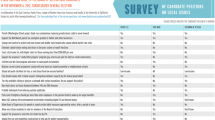Abstract
The growth of the planning function of government raises the question of how planning can be accomplished by democratic means. A new technological device—the teaching computer—seems to be ideally suited for disscussions between “experts” and the public on issues of medium and long-range planning. The teaching computer can be thought of as a mass communications system with feedback.
Similar content being viewed by others
References
Olson, Mancur, Jr., Toward a Social Report, Department of Health, Education, and Welfare, Washington, D.C., January, 1969.
Moynihan, Daniel P., “Toward a National Urban Policy,” The Public Interest, No. 17 (Fall 1969) 3-20.
Semple, Robert B., Jr., “Nixon Weighs Plan to Enlarge Scope of Urban Council,” The New York Times, October 29, 1969.
Gelman, David, and Beverly Kempton, “New Issues for the New Politics: An Interview with Richard N. Goodwin,” The Washington Monthly, 1, (August 1969), 20.
Umpleby, Stuart, “The Delphi Exploration: A Computer-based System for Obtaining Subjective Judgments on Alternative Futures,” Social Implications of Science and Technology Report F-1, Computer-based Education Research Laboratory, University of Illinois, Urbana, Illinois, August, 1969. 220 pages.
Osgood, Charles E., and Stuart Umpleby, “A Computer-based System for Exploration of Alternative Futures for Mankind 2000,” in Robert Jungk and Johan Galtung, eds., Mankind 2000, pp. 346–369. Oslo: Norwegian Universities Press, 1969.
Lamont, Valarie, “PLATO Program on the Boneyard Creek,” Computer-based Education Research Laboratory, University of Illinois, Urbana, Illinois, June, 1970.
“Involvement of the Public in Serious Thought about the Future through Simulation and Role-playing,” Research Proposal and Pilot Project from the Institute for Policy Studies, Washington, D.C. (Mimeographed, 6 pages.)
Guetzkow, Harold, et al., Simulation in International Relations: Developments for Research and Teaching. Englewood Cliffs, N.J.: Prentice-Hall, 1963.
de Sola Pool, Ithiel, Robert P. Abelson, and Samuel Popkin, Candidates, Issues and Strategies: A Computer Simulation. Cambridge: M.I.T. Press, 1964.
Bitzer, D. L., and D. Skaperdas, “The Design of an Economically Viable Large-Scale Computer-based Education System,” CERL Report X-5, February, 1969, University of Illinois, Urbana, Illinois. 32 pages.
Platt, John R., “What We Must Do,” Science, 166 (November 28, 1969), 1115–1122.
Author information
Authors and Affiliations
Additional information
The author wishes to acknowledge research support from the Program on the Social Implications of Science and Technology at the University of Illinois under National Science Foundation grant GR-60. The research described is being carried out through the Institute of Communications Research. The facility being used is located at the Computer-based Education Research Laboratory of the University of Illinois which is supported in part by the National Science Foundation under grant GF-81 and the Advanced Research Projects Agency under grant ONR-Nonr 3985 (08). This paper was presented at the second International Future Research Conference held in Kyoto, Japan, April 10–16, 1970.
Rights and permissions
About this article
Cite this article
Umpleby, S. Citizen sampling simulations: A method for involving the public in social planning. Policy Sci 1, 361–375 (1970). https://doi.org/10.1007/BF00145218
Issue Date:
DOI: https://doi.org/10.1007/BF00145218




